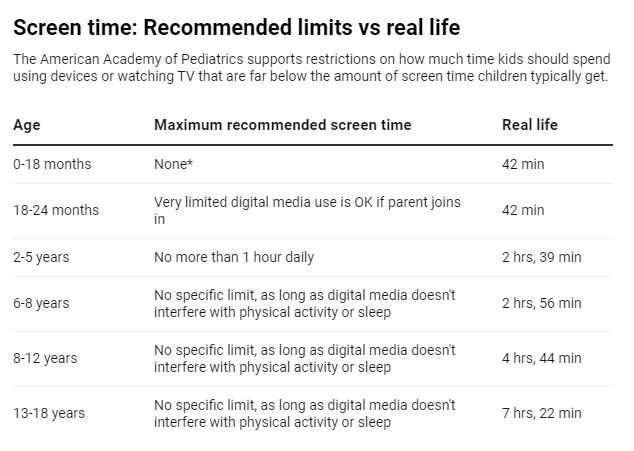
As families hunker down during the coronavirus pandemic, many parents may wonder how much screen time they should let their kids have. Brenna Hassinger-Das, a scholar of children and technology, shares one rule it’s OK to break, one rule parents can bend and a best practice worth upholding.
1. Break: Previous daily screen time limits
The American Academy of Pediatrics warns parents that letting children spend too much time watching TV shows or playing video games on any device can make them more anxious, reduce their ability to control impulses and disturb their sleep. How much screen time varies by age. The doctors’ group advises avoiding all screen time, aside from video chats, for babies and toddlers up to 18 months old, and sets gradually increasing limits after that.
Between the ages of two and five, for instance, the academy estimates that kids can safely get up to an hour of daily screen time, as long as their parents or caregivers join in. It advises parents of kids six and up to consistently limit time spent using digital media and to make sure that screen time doesn’t displace sleep or physical activity.
As a mom, I have to admit that these recommendations often seem impossible to follow. Personally, I believe that it’s worth breaking this particular rule. I have found the evidence behind the academy’s specific limits not compelling enough to warrant firmly adhering the guidelines with my own child, who is now six years old.
Professionally, I’ve observed that the available data doesn’t definitively indicate whether screen time makes kids significantly worse off. It only suggests that several behavioral and health problems might be related to excessive screen time. As I’m now teaching online and working from home, my child has been completing school lessons while relying on devices and spending more time than usual watching TV and playing games on our tablet. Life is changing in my house—as it has no doubt in yours too.
https://youtube.com/watch?v=rTXaAYd5adA%3Fcolor%3Dwhite
As of now, there’s little compelling evidence backing up concerns over the dangers of screen time for preschoolers, in particular. So when the parents of little kids let their child watch a video to make it possible for the grownups to make dinner or take a phone call, there’s no reason to beat themselves up.
Because the American Academy of Pediatrics doesn’t include video chatting as part of a child’s total screen time, it’s a good option to ramp up now, even for the very youngest. And some research suggests that babies can learn new words when they engage in a video chat but not from prerecorded videos. Video chatting can also help kids stay connected with their friends or members of their extended families whom they no longer can see in person. Consider using it to read stories, play the Go Fish card game or just talk about the day’s events.
2. Bend: Most restrictions on where and when to use devices
The American Academy of Pediatrics also advises parents to create tech-free zones and common situations at home. For example, the doctors’ group says that kids, especially little ones, should never use digital media while eating or during any kind of family gathering.
But I think it might sometimes be worth bending this rule.
Whether they’re coming home from work outside the home, teleworking or simply spending the day taking care of their children, all parents need some time to decompress or tackle household chores.
During this time of uncertainty, it might be time to make even more realistic trade-offs. Maybe it’s been a really tough day and having the whole family watch a TV show together at dinnertime will get you through it all without an argument. You can explain to your kids that this is not the new normal, just something unique to this unprecedented time.
https://youtube.com/watch?v=QL3iFIZ6jQg%3Fcolor%3Dwhite
3. Keep: Unplugged bedtime
However, one rule I consider worth keeping even when schools, day care centers and workplaces are shuttered is unplugging from tech at bedtime. Sticking to bedtime routines is really important for young children—those five years old and younger. Research indicates that kids with consistent bedtime routines do better in school and tend to behave better than their peers.
Studies suggest that even babies get less of the sleep they need if they interact with or watch screens at night. The same goes for preschool-aged kids—those between three and five years old.
Source: Read Full Article





